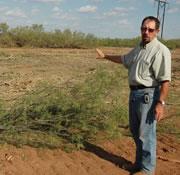 Jim Ansley is leading efforts to try and design a 'combine harvester' for mesquite trees.Kay Ledbetter / Texas Agricultural Experiment Station
Jim Ansley is leading efforts to try and design a 'combine harvester' for mesquite trees.Kay Ledbetter / Texas Agricultural Experiment StationThe mesquite tree is perhaps best known for its ability to lend that smoky flavour to an old-fashioned southern barbecue. But Texan researchers are now hoping that it might also help to relieve the dependence of the United States on fossil fuels.
Although useful as a barbecue fuel, mesquite trees are largely viewed as an invasive pest. Farmers and taxpayers already spend millions of dollars each year removing the trees from farmlands, where they steal space and resources from grazing grasses.
So using them as a raw material for biofuels such as ethanol could therefore kill two birds with one stone, suggests Jim Ansley of the Texas Agricultural Experiment Station in College Station, who is leading the project: adding incentive to remove the trees and creating energy from the waste.
But removing the shrubby trees, which can reach 6 to 9 metres in height, is not as simple as it sounds. Farmers have tried using pesticides, controlled burning and even bulldozers. "It's not easy to harvest, it's very gnarly," Ansley says. He and his colleagues are trying to develop ways to collect it as a harvested crop rather than on a tree-by-tree basis — and that will involve developing some kind of huge machine akin to a combine harvester for entire trees.
Tree harvesting
So far, Ansley and his team have spent $70,000 creating a mesquite 'vacuum cleaner' to scoop up branches and twigs after the trees have been mowed down by a conventional bulldozer. A rotor gathers up the woody material and shears off mesquite stumps, without harming the grass and valuable soil beneath.
“I don't think we would ever have a problem with losing mesquite.”
Jim Ansley
Texas Agricultural Experiment Station
Designing a single machine to combine both felling and collection would cost about half a million dollars, Ansley told the annual meeting of the Ecological Society of America in San Jose, California, where he presented the project.
Ansley suspects that, of the 52 million acres of Texas infested with mesquite, perhaps 20 million are dense enough to harvest economically using such machines. Other countries with vast tracts of ranch lands, such as Australia, might also be able to collect and use mesquite or similar trees in the same way.
The next step, says Ansley, is to calculate more precisely how mesquite harvesting would work. He envisages a network of small refineries taking 10-year-old mesquite wood from surrounding ranch lands within a radius of 30 kilometres, and redistributing the resulting ethanol to mix with gasoline for greener fuel. "I've been amazed at the level of interest," he says. "Every counsellor of the small rural towns in west Texas has been in touch. A lot of them think we've got the refinery there already though."
That reality is, however, quite some way off.
Burning future
There is a growing interest in generating ethanol fuel from the cellulose in plant material; fuel stocks such as trees and grasses are cheaper, more sustainable raw materials, and require little or no fertilizer or other farming techniques to grow. Switching to such fuel stocks would reduce the bioethanol sector's current reliance on corn grain as a raw material, which is criticized by many economists and ecologists as unsustainable.
But there is as yet no commercial method to transform material from woody plants such as mesquite into biofuel economically. "We need a technological breakthrough," Ansley admits.
ADVERTISEMENT
But there are other ways of harvesting energy from the plants. Ansley forecasts that small communities could start to build 'bioheat' power stations using harvested mesquite, burning the wood to create green electricity on a small scale. "Fifty to 100 years down the road I think it's a very attractive option," he says. "It would be equivalent to having solar panels or a small windmill for a town."
As for that unique barbecue taste, would it become a thing of the past? Ansley says the invasive pest species is a readily replenished resource, meaning more barbecues for a long while yet. "I don't think we would ever have a problem with losing mesquite," he jokes.
Visit our upasmokysolution.html">newsblog to read and post comments about this story.
Texas Agricultural Experiment Station
